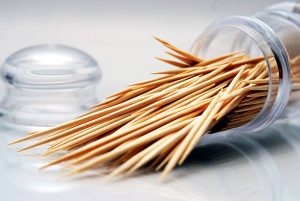 If you’re like many Americans, you probably have toothpicks in your home. They are handy to have around the house to pick food from your teeth. Charles Foster, an American businessman, began the mass production of toothpicks in the nineteenth century after a trip to Brazil. During his visit, he noticed Brazilians had amazing smiles, which they credited to using toothpicks. Although they are effective at dislodging food particles, are toothpicks good for your teeth? They aren’t as safe as you might believe. They can place you at risk of a dental emergency. You can skip the risks and keep your teeth clean using a few dentist-approved alternatives.
If you’re like many Americans, you probably have toothpicks in your home. They are handy to have around the house to pick food from your teeth. Charles Foster, an American businessman, began the mass production of toothpicks in the nineteenth century after a trip to Brazil. During his visit, he noticed Brazilians had amazing smiles, which they credited to using toothpicks. Although they are effective at dislodging food particles, are toothpicks good for your teeth? They aren’t as safe as you might believe. They can place you at risk of a dental emergency. You can skip the risks and keep your teeth clean using a few dentist-approved alternatives.
Potential Risks of Toothpicks
The pointy ends of toothpicks can fit into small spaces where food particles can get trapped, like between teeth or where restorations meet the gum line. While they are a go-to solution for many Americans, they can increase your risk of many issues because they can break or splinter. The small slivers can get trapped between teeth or in your gum tissue, causing irritation, injuries, or infections.
Toothpicks can also damage dental work. They can easily pop off a veneer, crown, or filling, which will require a trip to an emergency dentist.
If toothpicks aren’t stored in a clean environment, you can introduce harmful bacteria into your mouth, which can increase your risk of infections.
Safe Alternatives to Toothpicks
Although having food stuck in your teeth can be an annoyance, your dentist will recommend skipping any sharp or pointed objects to free the debris, including toothpicks. Instead, you can avoid a dental emergency by using a few safe home remedies:
- Dental Floss: Flat waxed dental floss fits between teeth easily to remove food and plaque. It’s best to use floss that has earned the American Dental Association’s Seal of Acceptance, which means it has undergone voluntary testing for safety and effectiveness.
- Flosser: Dental flossers can be easier to use than traditional floss. They also have a pointed end, which is softer than a toothpick. It isn’t as likely to splinter or break; however, don’t apply too much pressure to avoid damaging your gums.
- Waterflosser: A waterflosser emits gentle pressurized water to clean hard-to-reach areas.
If home remedies don’t do the trick, it’s time to turn to a professional for help. Contact your dentist for an appointment. They’ll get you into the office quickly to remove the trapped debris, so you can get back to enjoying the day.
Don’t let a minor issue turn into a big problem. Leave toothpicks for checking baked goods or craft projects. Don’t risk your smile to the potential risks of toothpicks.
About Dr. Jonathan Zahner
Dr. Zahner earned his dental degree from the University of Connecticut and has regularly continued his education in many specialties to help each patient achieve their best smile. He is a proud member of the American Dental Association and the Connecticut State Dental Association. If you need a dentist in a hurry, request an appointment through our website or call (860) 265-4591.
